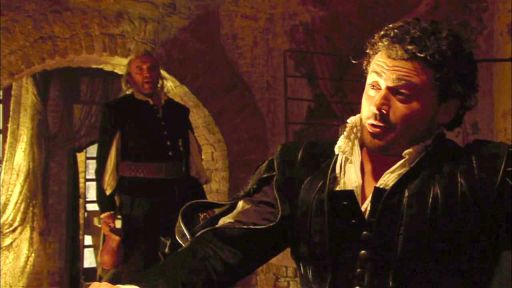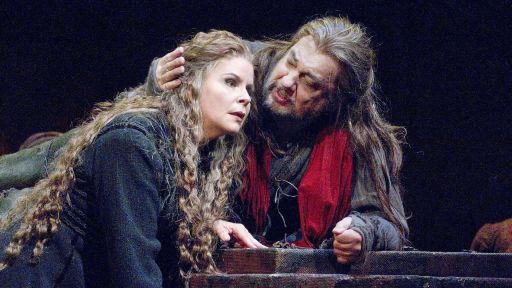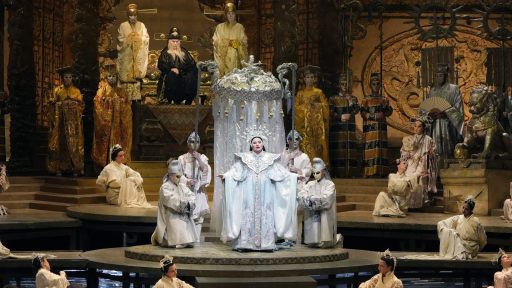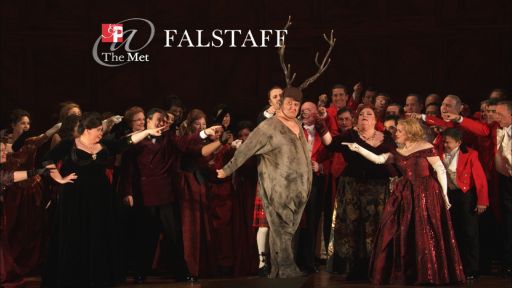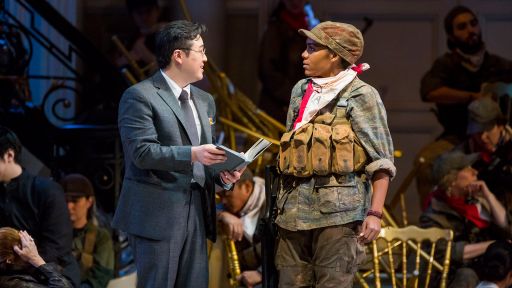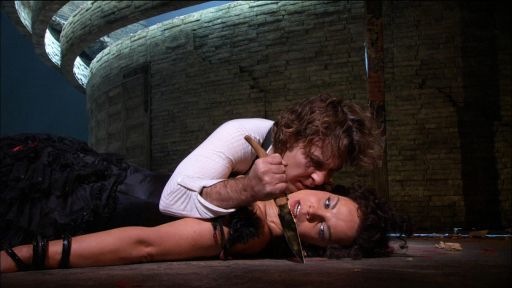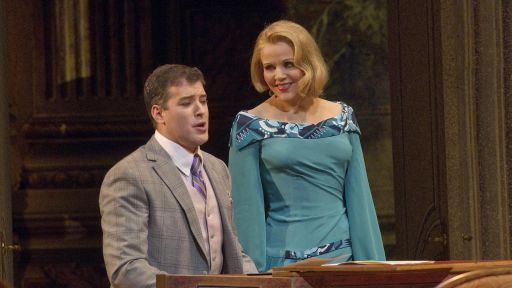Giuseppe Verdi’s Rigoletto – recorded in high definition in the Renaissance splendor of Mantua, Italy, in the actual places and hours of the day specified in the libretto– was broadcast live around the world, or as close as time zones would allow, on September 4 and 5, 2010. Now, that critically acclaimed broadcast – hailed by President of the Italian Republic Giorgio Napolitano as a “great National event,” comes to Great Performances Friday, July 15 at 9:30 p.m. ET on PBS (check local listings).
With Rigoletto from Mantua, producer Andrea Andermann continues his successful series of “Live Films.” His productions of both “Tosca” by Puccini and “La Traviata” were Great Performances landmarks in 1992 and 2000 respectively. Those two innovative and spectacular productions received much public and critical success, confirmed by international television awards including seven Primetime Emmy’s and the UK BAFTA’s.
Directed by Marco Bellocchio, Rigoletto from Mantua stars Plàcido Domingo in the baritone title role of Rigoletto; Julia Novikova as his innocent daughter Gilda; Vittorio Grigolo as the womanizing Duke; and Ruggero Raimondi as the assassin Sparafucile.
The production marks Domingo’s third major project for Great Performances this season. (The career retrospective, Plácido Domingo: My Favorite Roles and LA Opera’s Il Postino will each be broadcast this fall.)
Academy Award-winning Vittorio Storaro shot the vivid high definition cinematography. The RAI National Symphony Orchestra was conducted by Zubin Mehta. The opera is one of the maestro’s favorite operas. “It is not only Verdi at the peak of his creativity but also a spectacular theatrical ‘thriller,’” says Mehta.
Critics around the world raved about the results. The Sunday Times of London proclaimed, “What a triumph for the producer and the technical team.” The BBC marveled, “It was just fantastic the way they made it all work.” Il Tempo dubbed it “Colossal.” Le Libre Belgique enthused, “The cast is fabulous and images resound from a tension both visible and emotional.”
Tenor Domingo has a special relationship to “Rigoletto.” It was the first opera he ever heard; the character of Borsa was his first operatic role; he sang the Duke many times; and he has conducted the work on numerous occasions. Domingo had qualms about taking on the titular baritone role. “When Andrea Andermann invited me to interpret the part of Rigoletto, I replied that there were so many good baritones in the world who could sing it. But Andrea said that he wasn’t looking for a baritone, but rather for the Rigoletto [that I] could bring to life.”
Now, he gives voice and soul to Rigoletto, a court jester, who after publicly ridiculing a nobleman, Count Ceprano, is tragically punished by the courtiers for his unforgivable insolence.
Gilda, the attractive, sheltered daughter of Rigoletto, pays the price with her life for the errors of her father and the mistaken love for the cynical Duke of Mantua, a powerful and handsome man, intoxicated and driven by the taste of female conquest. Gilda becomes bewitched by the Duke in disguise believing that he is a young student, and subsequently falls in love with him, but in reality, nothing is what it appears to be and the fate of the characters entwine dangerously until the tragic end.
Based on how it was conceived and developed, Rigoletto from Mantua is one of the most complex audio-visual operations ever attempted. Through an advanced and sophisticated technological system, the locations in different points of the city of Mantua were seamlessly linked together. Maestro Mehta performed the music of Verdi from the Teatro Scientifico Bibiena.
The 16th century comes to life in the accomplished photography of Vittorio Storaro, who performed similar duty for the first two live operas. Bellocchio achieved the difficult task of leading the artists in the interpretation of the characters, all the while dealing with the complex task of directing a Live Film.
The locations chosen included: the sumptuous rooms of Palazzo Te, the famous villa of parties, receptions and idleness of the Duke of Mantua, built between 1525 and 1535 by the architect and painter Giulio Romano at the will of Federico II Gonzaga; Palazzo Ducale, the main residence of the Gonzaga rulers, Marquis and ultimately the dukes of the city of Mantua, also The Fortress of Sparafucile, known as the Rock of Rigoletto, a former military garrison Gonzaga located at the entrance to the city of Mantua.
For Great Performances, John Walker is producer; Bill O’Donnell is series producer; and David Horn is executive producer.
Major funding for the Great Performances telecast is provided by the Anna-Maria and Stephen Kellen Arts Fund, The Lillian Goldman Programming Endowment, and the Philip and Janice Levin Foundation.

